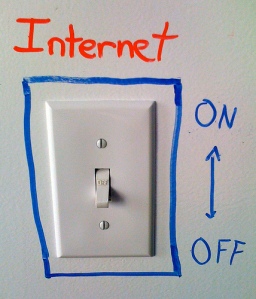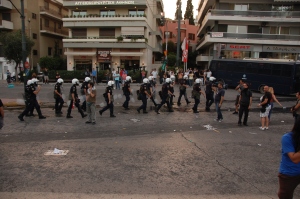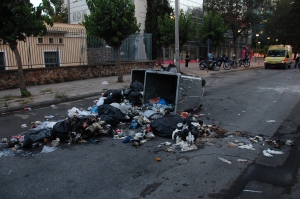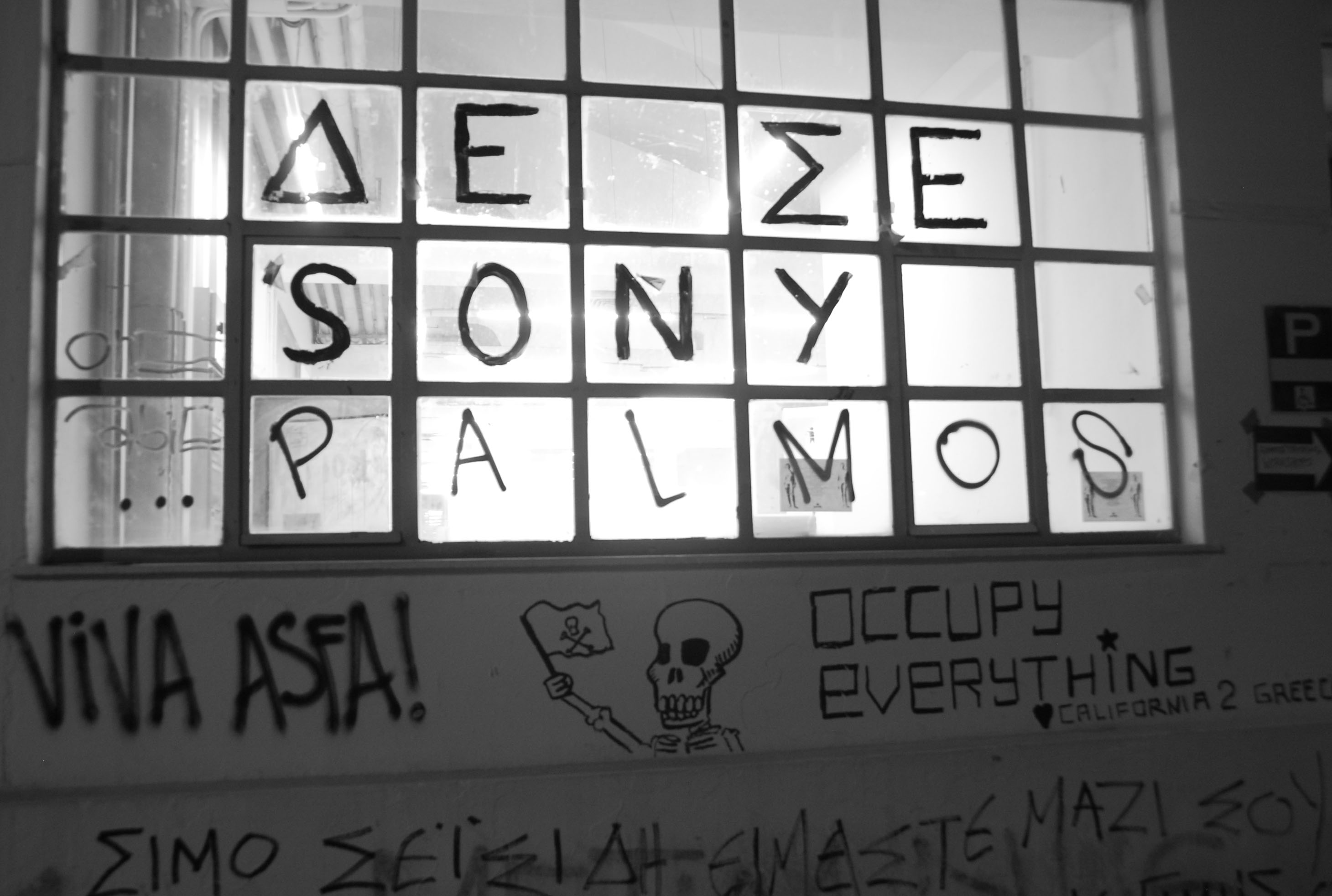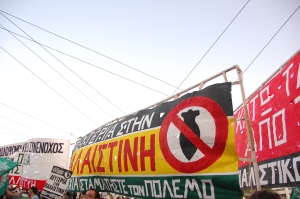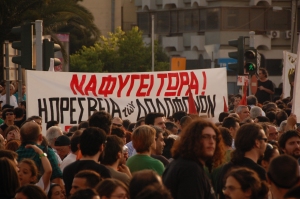Αυτή η είδηση ανέβηκε στο cnet
στις 10/6/2010.
Παραθέτω αυτούσια την είδηση στα αγγλικά αλλά ακολουθεί αμέσως μετά μια περίληψη στα ελληνικά από το adslgr.com..
The legislation announced Thursday says that companies such as broadband providers, search engines, or software firms that the government selects "shall immediately comply with any emergency measure or action developed" by the Department of Homeland Security. Anyone failing to comply would be fined.
That emergency authority would allow the federal government to "preserve those networks and assets and our country and protect our people," Joe Lieberman, the primary sponsor of the measure and the chairman of the Homeland Security committee, told reporters on Thursday. Lieberman is an independent senator from Connecticut who caucuses with the Democrats.Because there are few limits on the president's emergency power, which can be renewed indefinitely, the densely worded 197-page bill (PDF) is likely to encounter stiff opposition.
TechAmerica, probably the largest U.S. technology lobby group, said it was concerned about "unintended consequences that would result from the legislation's regulatory approach" and "the potential for absolute power." And the Center for Democracy and Technology publicly worried that the Lieberman bill's emergency powers "include authority to shut down or limit Internet traffic on private systems."
The idea of an Internet "kill switch" that the president could flip is not new. A draft Senate proposal that CNET obtained in August allowed the White House to "declare a cybersecurity emergency," and another from Sens. Jay Rockefeller (D-W.V.) and Olympia Snowe (R-Maine) would have explicitly given the government the power to "order the disconnection" of certain networks or Web sites.
On Thursday, both senators lauded Lieberman's bill, which is formally titled the Protecting Cyberspace as a National Asset Act, or PCNAA. Rockefeller said "I commend" the drafters of the PCNAA. Collins went further, signing up at a co-sponsor and saying at a press conference that "we cannot afford to wait for a cyber 9/11 before our government realizes the importance of protecting our cyber resources."
Under PCNAA, the federal government's power to force private companies to comply with emergency decrees would become unusually broad. Any company on a list created by Homeland Security that also "relies on" the Internet, the telephone system, or any other component of the U.S. "information infrastructure" would be subject to command by a new National Center for Cybersecurity and Communications (NCCC) that would be created inside Homeland Security.
The only obvious limitation on the NCCC's emergency power is one paragraph in the Lieberman bill that appears to have grown out of the Bush-era flap over warrantless wiretapping. That limitation says that the NCCC cannot order broadband providers or other companies to "conduct surveillance" of Americans unless it's otherwise legally authorized.
Lieberman said Thursday that enactment of his bill needed to be a top congressional priority. "For all of its 'user-friendly' allure, the Internet can also be a dangerous place with electronic pipelines that run directly into everything from our personal bank accounts to key infrastructure to government and industrial secrets," he said. "Our economic security, national security and public safety are now all at risk from new kinds of enemies–cyber-warriors, cyber-spies, cyber-terrorists and cyber-criminals."
A new cybersecurity bureaucracy
Lieberman's proposal would form a powerful and extensive new Homeland Security bureaucracy around the NCCC, including "no less" than two deputy directors, and liaison officers to the Defense Department, Justice Department, Commerce Department, and the Director of National Intelligence. (How much the NCCC director's duties would overlap with those of the existing assistant secretary for infrastructure protection is not clear.)
The NCCC also would be granted the power to monitor the "security status" of private sector Web sites, broadband providers, and other Internet components. Lieberman's legislation requires the NCCC to provide "situational awareness of the security status" of the portions of the Internet that are inside the United States — and also those portions in other countries that, if disrupted, could cause significant harm.
Selected private companies would be required to participate in "information sharing" with the Feds. They must "certify in writing to the director" of the NCCC whether they have "developed and implemented" federally approved security measures, which could be anything from encryption to physical security mechanisms, or programming techniques that have been "approved by the director." The NCCC director can "issue an order" in cases of noncompliance.
The prospect of a vast new cybersecurity bureaucracy with power to command the private sector worries some privacy advocates. "This is a plan for an auto-immune reaction," says Jim Harper, director of information studies at the libertarian Cato Institute. "When something goes wrong, the government will attack our infrastructure and make society weaker."
To sweeten the deal for industry groups, Lieberman has included a tantalizing offer absent from earlier drafts: immunity from civil lawsuits. If a software company's programming error costs customers billions, or a broadband provider intentionally cuts off its customers in response to a federal command, neither would be liable.
If there's an "incident related to a cyber vulnerability" after the president has declared an emergency and the affected company has followed federal standards, plaintiffs' lawyers cannot collect damages for economic harm. And if the harm is caused by an emergency order from the Feds, not only does the possibility of damages virtually disappear, but the U.S. Treasury will even pick up the private company's tab.
Another sweetener: A new White House office would be charged with forcing federal agencies to take cybersecurity more seriously, with the power to jeopardize their budgets if they fail to comply. The likely effect would be to increase government agencies' demand for security products.
Tom Gann, McAfee's vice president for government relations, stopped short of criticizing the Lieberman bill, calling it a "very important piece of legislation."
McAfee is paying attention to "a number of provisions of the bill that could use work," Gann said, and "we've certainly put some focus on the emergency provisions."
Και παραθέτω και περίληψη στα ελληνικά που βρήκα στο adslgr.com
"Μία νομοθετική πρόταση στο σώμα της Γερουσίας των Η.Π.Α. θα επιτρέπει, αν υιοθετηθεί, στον Πρόεδρο της χώρας να αποκτά άμεσο έλεγχο στο διαδίκτυο και ακόμα στον τερματισμό λειτουργίας τμημάτων του (kill switch), σε εξαιρετικά έκτακτες συνθήκες. Το κείμενο που παρουσιάστηκε την περασμένη εβδομάδα αναφέρει συγκεκριμένα πως επιλεγμένες από την κυβέρνηση εταιρείες όπως οι πάροχοι ευρυζωνικών συνδέσεων, οι μηχανές αναζήτησης και γενικώς εταιρείες λογισμικού θα πρέπει να υπακούν αμέσως σε οποιαδήποτε έκτακτο μέτρο ή ενέργεια που θα διατάξει το Υπουργείο Εσωτερικής Ασφάλειας. Σε αντίθεση περίπτωση θα έρχονται αντιμέτωπες με πρόστιμα.
Tο νέο αυτό θεσμικό πλαίσιο θα επιτρέψει στην κυβέρνηση, σύμφωνα με το σκεπτικό των εισηγητών του νομοσχεδίου, "να διατηρήσει τον έλεγχο στα δίκτυα και τις υποδομές της χώρας και να προστατεύσει τους πολίτες της". Αυτό δήλωσε ο ανεξάρτητος γερουσιαστής του Κονέκτικατ Joe Lieberman, βασικός υπερασπιστής της ιδέας και πρόεδρος της Επιτροπής Εσωτερικής Ασφάλειας.
Λόγω και των ελάχιστων ορίων στις έκτακτες αρμοδιότητες του Προέδρου, όπως αυτές περιγράφονται στο πυκνογραμμένο κείμενο των 197 σελίδων, το νομοσχέδιο αναμένεται να συναντήσει έντονες αντιδράσεις.
Η οργάνωση TechAmerica (πρόκειται για το μάλλον μεγαλύτερο στις Η.Π.Α. lobby group) δήλωσε πως ανησυχεί για τις "ακούσιες συνέπειες που θα μπορούσαν να προκύψουν από την νομοθετική αυτή προσέγγιση" καθώς και από την "ενδεχόμενα απόλυτη δύναμη". Όμως και το Κέντρο Δημοκρατίας και Τεχνολογίας εξέφρασε τις ανησυχίες του σχετικά με την δυνατότητα να τερματίζεται ή να περιορίζεται η λειτουργία του διαδίκτυου και συναφών ιδιωτικών επιχειρήσεων".
Η ιδέα της δυνατότητας τερματισμού λειτουργίας του διαδίκτυου (ή έστω ενός μέρος του) από τον Πρόεδρο της χώρας δεν είναι νέα, αφού παρόμοιες προσπάθειες έγιναν από άλλους γερουσιαστές τον περασμένο Αύγουστο. Ο γερουσιαστής Collins δήλωσε υποστηρικτής του νομοσχεδίου και συμπλήρωσε πως:
"Δεν μπορούμε να περιμένουμε για μία διαδικτυακή 11η Σεπτεμβρίου προκειμένου να κατανοήσει η κυβέρνηση μας την σημασία της προστασίας των ψηφιακών μας πόρων."
Να σημειωθεί πως η ισχύς της κυβέρνησης των Η.Π.Α. να επιβάλει σε εταιρείες έκτακτα μέτρα είναι σύμφωνα με την πρόταση νόμου, ασυνήθιστα ευρύτατη. Οποιαδήποτε εταιρεία η οποία θα βρίσκεται στην λίστα του Υπουργείου Εσωτερικής Ασφάλειας και θα βασίζεται στο διαδίκτυο, στο τηλεφωνικό δίκτυο ή οποιοδήποτε άλλο κομμάτι της πληροφοριακής υποδομής των Η.Π.Α. θα υπόκειται στον έλεγχο του νέου Εθνικού Κέντρου για την Ασφάλεια στο Διαδίκτυο και τις Επικοινωνίες (National Center for Cybersecurity and Communications).
Ο μόνος περιορισμός σε αυτές τις έκτακτες εξουσίες είναι αυτός που περιγράφεται σε μόνο μία παράγραφο ανάμεσα στις 197 σελίδες κειμένου. Η παράγραφος αυτή αναφέρει πως η NCCC, η νέα αυτή υπηρεσία ασφάλειας, δεν θα μπορεί να διατάξει τους παρόχους να παρακολουθούν τους πολίτες της χώρας εκτός και αν είναι νομίμως εξουσιοδοτημένες.
Τέλος ανημοδημοσιεύσεων και έναρξη σχολίου…
Σε κάποιο thread είχαμε ανοίξει μια συζήτηση με κάποιον για το κατά πόσο το διαδίκτυο θα παραμείνει «ελεύθερο» και κατά πόσο το κράτος θα προσπαθήσει να το ελέγξει.
Είναι το διαδίκτυο τελικά τοσό σημαντικό για το κράτος που θέλει να το θέσει υπό τον έλεγχό του;
Η απάντηση δεν είναι απλά ναι… το διαδίκτυο αυτή τη στιγμή ή σε λίγα χρόνια μπορεί να μετατραπεί στο μεγάλυτερο όπλο κατά της κρατικής μηχανής, με δύο τρόπους.
Ο πρώτος τρόπος είναι μέσω της εισβολής σε δίκτυα κρατικών υπηρεσιών. Επίσης η ζημιά που μπορεί να κάνει κάποιος ληστεύοντας μια τράπεζα σε σύγκριση με τη ζημιά μέσα από μια επίθεση στη βάση δεδομένων μιας τράπεζας είναι αμελητέα. Είναι πολύ δυσκολο να συμβεί γιατί χρειάζεται πολύ μεγάλη επεξεργαστική ισχύ, γιατί οι τράπεζες έχουν συστήματα πολύ εξελιγμένα.
Το άλλο πεδίο στο οποίο το ίντερνετ μπορεί να αποβεί σημαντικό όπλο κατά του κράτους και της καθεστηκυιας τάξης είναι στο πεδίο της ενημέρωσης και της προπαγάνδας. Το ίντερνετ πλέον θα γαλουχήσει τις επόμενες γενεές. Σε μερικά χρόνια θα αντικαταστήσει και την τηλεόραση. Σε αντίθεση με τα συμβατικά μέσα ενημέρωσης το διαδίκτυο δεν είναι ελεγχόμενο τουλάχιστον όχι στον ίδιο βαθμό. Και αυτό μπορεί να αποβεί εμπόδιο στις επιδιώξεις των εκάστοτε πολιτικών, ηγετών, θιασωτών του καπιταλιστικού συστήματος και πολλών άλλων που θέλουν η κοινωνία της ανισότητας και της αδικίας να ζει και να βασιλεύει.
Έτσι λοιπόν με πρόφαση την ασφάλεια των πολλών για άλλη μια φορά και πάντα με σημείο εκκίνησης τις Η.Π.Α εγκαινιάζονται νέες μορφές εξουσίας και ελέγχου επί του διαδικτύου…
Ακόμα και στην Ευρώπη κάποιες αντιτρομοκρατικές διατάξεις θέλουν να θέσουν υπό έλεγχο τμήματα του διαδικτύου και όχι μόνο, αλλά κάθε μέσου που μπορεί να προπαγανδίζει υπέρ της τρομοκρατίας.
Ο πόλεμος θα είναι μακρύς…
j4nus
Short Link:https://asylo.squat.gr/?p=1220
